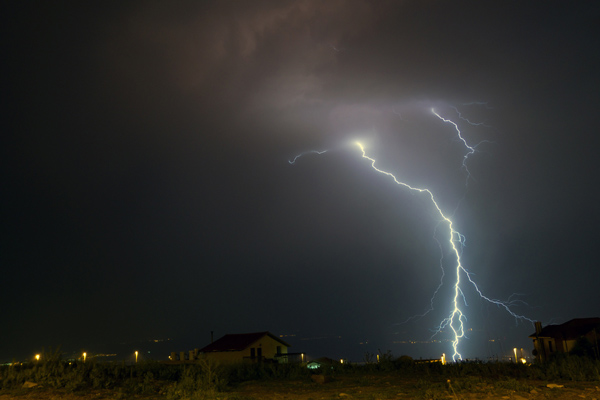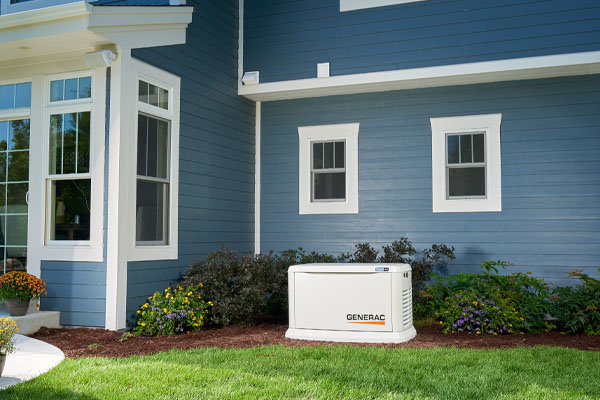
There has been so much progress with access to reliable power. However, even the most modern power grids are not perfect and will falter from time to time. Power failures occur because of accidents, severe weather, equipment failure, construction damage, high energy demand, and more. This is why many homes and buildings depend on backup generators to provide power when there is a power outage. Generators can also supply electricity to areas that aren’t within the supply radius of the grid. However, there are many who still inquire, “How does a generator work?”. In this article, we answer this common question.
How Does A Generator Work?
Contents
Often called a standby generator, it utilizes mechanical energy and converts it to electrical energy. After this, the electricity is transmitted and distributed throughout your home or building. A generator can also supply power to aircraft, ships, trains, and automobiles. Some areas also use generators as alternative power sources.
A generator uses the electromagnetic induction principle to operate. A copper conductor coil is inside a generator, rotating between a horseshoe-shaped magnet. The coil and its metal core are known as the armature. It rotates to generate the needed energy to power the generator. The generator’s engine runs on fuel, such as natural gas, petrol, natural energy, or diesel.
When the coil rotates, it interferes with the magnetic field within the two magnetic poles located in the horseshoe-shaped magnet. This magnetic field interference agitates the electrons in the conductor. As a result, an electric current is induced to flow.
The alternator, also called the generating unit, generates an alternating current. It is the same as what the power grid supplies. Alternating current is a dependable and stable kind of power. It can power sensitive appliances like computers, air conditioners, and even surgical equipment without worrying about fluctuations.
Generator engines come in different sizes. The type equipped with the largest engines is called liquid-cooled types. They have a pump that circulates the coolant throughout the system as a fan blows air. This way, the coolant temperature is reduced. Liquid-cooled generators are recommended to use in hot and humid places so that the unit keeps from overheating.
How Much Power Can A Backup Generator Produce?
The generator’s power capacity depends on the engine size. Having a larger engine means that the generator produces more energy for your home or building. The unit’s output is typically in watts (W) or kiloWatts (kW). The former is measured as Volts x Amps. For instance, a 10kW generator can supply 240 Volts. Therefore, its estimated output is 41.67 or 42 amps. This can sufficiently power a 1200 W refrigerator, one 1000 W microwave, one 1000 W sump pump, one 500 W furnace fan, and around 10 lighting circuits that total 1000 W. There is also enough power for small appliances like radio, laptop, and a desktop computer, depending on their needed input.
Benefits Of Using A Standby Generator

The primary advantage of a standby generator is you have access to a power source during an emergency. Power outages can happen at any time. Therefore, generators are essential, especially if you live in an area with unreliable electricity sources. It is also a necessity for businesses and services, particularly those that rely on electricity to provide their services. Examples of these are factories, clinics, hospitals, and pharmacies.
Portable standby generators are also a necessity for care personnel and medical staff during blackouts caused by natural disasters and other emergencies. This provides lighting and powers any machines and equipment needed to conduct medical procedures, rescues, and other vital services.
Another critical advantage generators provide is waste and damage prevention. Generators will turn on automatically when the power goes out. Therefore, all appliances and equipment continue running, ensuring that operations continue smoothly and uninterrupted. As a result, products like food and medications will be produced continuously. It also helps prevent these goods from getting spoiled and keeps microorganisms from growing on them.
Features Of Whole-House Generators
Some of the features generators have, include:
- Power – Generators come in varying power output capacities. This way, they can power different structures, from small homes to large buildings like factories. Having different power capacities means that each user can match their needs to the generator they select.
- Fuel – A generator can be powered by LPG, diesel, petrol, diesel, or other energy sources. This way, a wide range of customers can use a generator to supply their power requirements.
- Noise – Older generators are notorious for producing loud noises. Many modern generator models feature noise-reducing technology, allowing them to operate even though they are close to buildings or structures such as offices, hospitals, schools, and zoos, to name a few.
Conclusion
Aside from providing convenience and comfort, generators can literally save lives. They offer stability and flexibility as well. Some models are also portable in that they can be easy to transfer when needed. Since they are equipped with improved design and extra features, generators are also safe to use and easy to operate. The most reliable brands will also last a long time.
Keep in mind that there are factors to consider before purchasing a generator. You need to make sure that the type and capacity fit with the power requirements your home or building has. It is always best to contact a professional to discuss your power needs. This way, you can make an informed decision and choose the best option for you and your home.
Call PFO Heating & Air Conditioning For All Of Your Standby Generator Requirements

If you need more information about a backup generator, call PFO Heating & Air Conditioning. Our professionals are the best in the business, capable of providing you with exemplary service at the best prices. Our expert technicians will discuss your power needs and provide an estimate free of cost. If you have concerns and inquiries, our customer service department can offer you quick and accurate advice.
PFO Heating & Air Conditioning recommends Generac Generators. Generac is one of the nation’s top manufacturers of standby generators, known for their high-quality performance and reliability. Be ready for unexpected power outages and call us today.
Click here to contact us now or call us at (800) 253-9001 to find out more!



